Presenting the Case for Islamic Banking and Finance
Sharp fluctuations in the global economic system call for an interest-free institutional mechanism for banking and finance, a three-day conference at Srinagar concludes.
Srinagar June 3: A three-day international conference on “Interest-Free Institutional Mechanism (Banking, Finance and Insurance)” for promoting investment organised by the Department of Business and Financial Studies, University of Kashmir in collaboration with Institute of Objective Studies, New Delhi, began here today.
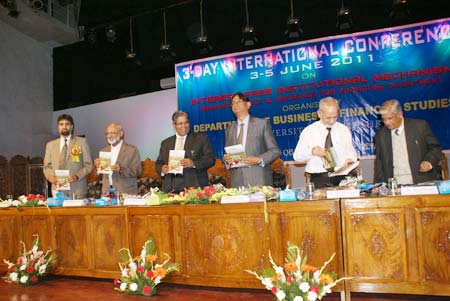
A View of Book Release
KU Vice-chancellor, Prof Talat Ahmad, who chaired the inaugural event, said that the collapse of leading Wall Street institutions, notably Lehman Brothers, and the subsequent global financial crisis and economic recession had motivated academics as well as businesspersons worldwide to identify a sustainable banking and financial solution. He said that many financial experts had recommended Islamic banking and finance, which they projected as based on an interest-free philosophy and as an alternative model.
Islamic banking and finance was concerned with justice in financial contracts to ensure that none of the parties was being exploited. In fact, this alternative model was governed by ethics and passion for human welfare, Prof. Talat said.
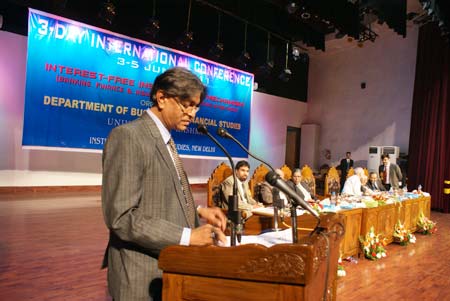
Speaker: Prof Talat Ahmad, Vice-chancellor, Kashmir University
He explained that Islamic banking and insurance had experienced a growth rate of 10-15 percent per annum globally over the last decade and had been gaining popularity in conventional banking system at such a rapid pace that Islamic financial institutions were present today in over 51 countries.
The Vice-chancellor of Central University, Prof Abdul Wahid Qureshi, was the special guest.
Chief guest Mr K Rehman Khan, Deputy Chairman Rajya Sabha, said resistance to change made it difficult for India to adopt the Islamic concept of banking and finance. No system could function without an institutional mechanism, Mr Khan said. An institutional mechanism, a regular accounting and auditing standards had to be designed to give the best economic system to the world.
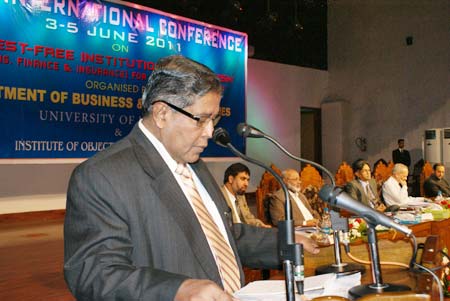
Speaker: Mr K Rehman Khan, Deputy Chairman Rajya Sabha
In his keynote address Dr Ausaf Ahmad, former head special assignments IDB, Jeddah and finance secretary IOS, said that the modern financial structure was devoid of moral dimension whatsoever. “In this respect, Islamic finance is much better placed than contemporary financial structure.”
He said that in Islamic finance, legal and moral constraints operated both on the demand and supply side of credit. He added that Islamic finance did offer a way out of the present quagmire. Whether policy makers, regulators and architects of contemporary international financial system would take it was a moot question. “Probably, it is expecting too much that the international financial system would be replaced by the Islamic financial system in its entirety. However, it could be expected that some important features of Islamic system would be incorporated if a large-scale reform of international financial architecture was undertaken.
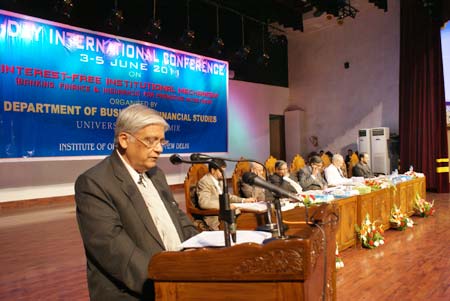
Speaker: Dr Ausaf Ahmad, former head special assignments IDB, Jeddah and finance secretary IOS
In his welcome address, the head of Department of Business and Financial Studies and conference director, Professor Nazir A Nazir, said that the interest-based conventional market mechanism was being widely criticised for promoting speculationary tendencies that brought strife and suffering in many mature economies of the world. The recent financial crisis caused by sub-prime lending in US, which finally triggered the global economic meltdown, had forced economists and financial experts to rethink about the veracity of the existing financial system.
Professor Nazir added that given this scenario the critics of conventional financial system had started showing inclination towards the Islamic financial system as a viable alternative to the new global financial order. To facilitate this, there was a need for revamping the present regulatory framework to make it more flexible and suitable for creating a scope for having an interest-free banking and financial system in the country, he opined.
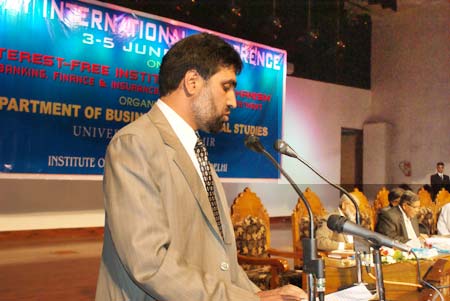
Speaker: Professor Nazir A Nazir, Head of Department of Business and Financial Studies and Conference Director
The registrar of Kashmir University, Prof. Syed Fayaz, in his vote of thanks said that the three-day conference would discuss and share research experiences about various aspects of interest-free financial system. Scholars would discuss operationalisation of the interest-free institutional mechanism and highlight the regulatory and operational problems likely to be encountered by an interest-free financial system.
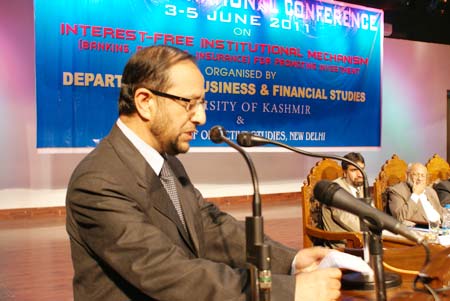
Speaker: Prof. Syed Fayaz, Registrar of Kashmir University
In his introductory remarks Dr M. Manzoor Alam, Chairman IOS, New Delhi, said that the conference in Srinagar had a lot of potential as it was aimed at achieving objectives like sharing research experience, deliberation on coexistence of Islamic and the conventional financial system and highlighting the regulatory and operational problems likely to be encountered in the implementation of Islamic financial system.
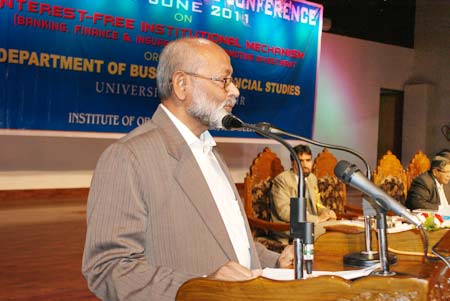
Speaker: Dr M. Manzoor Alam, Chairman IOS
June 4-5: During the course of five business sessions spread over two days, fifty one papers were contributed. The papers were categorised into five sub-themes and presented in the relevant sessions including:
• Developing an interest-free economy: Legal and regulatory challenges
• Interest-free financing in India: Evolving an appropriate framework
• Risk management and Islamic finance
• Interest-free non-banking financial institutions and their regulation
• Developing an institutional structure for Islamic financial markets
The five business sessions were chaired and co-chaired by experts from India and abroad, including Mr. K Rehman Khan, Deputy Chairman, Rajya Sabha; Dr M. Manzoor Alam, Chairman, IOS, New Delhi; Prof. Musadiq Amin Sahaf, Dean, Faculty of Commerce and Management Studies, University of Kashmir; Mr. R K Dubey, Executive Director, Central Bank of India; Prof. Mohi-ud-Din Sangmi; Prof. Khursheed A Butt, Director, South Campus, University of Kashmir; Dr. Manzoor A Shah; Dr. Ausaf Ahmad, General Secretary, IOS; Prof. Zahoor Mohammad Khan, Secretary General IOS; Dr. R A Rainayee and Dr. Kareem Mohammad from the embassy of Islamic Republic of Iran, New Delhi. Besides, each business session opened with a keynote address.
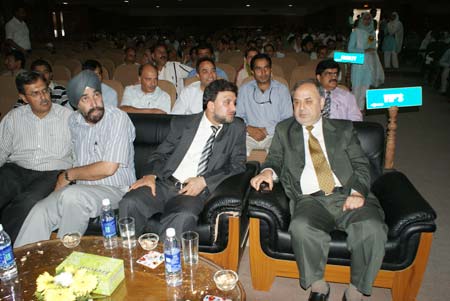
A view of audience
The papers, authored by one hundred and one scholars, highlighted a variety of aspects ranging from the reasons of the intermittent breakdown of the interest-based conventional banking and economic system to the development of the more humane, natural and interest-free financial architecture capable of ensuring equitable and inclusive economic growth at the global level.
More pertinently, a number of presentations underscored the need for adoption of interest-free banking practices and maintained that Islamic and Shariah-compliant financial architecture must at least supplement the traditional banking system that was essentially exploitative and had historically done more damage than good. Interestingly, those who criticised the interest-based conventional market mechanisms as being speculative and abusive and vehemently favoured its replacement by the Islamic financial system included some non-Muslim scholars. Each technical session concluded with queries and questions from the audience which were responded to by the scholarly paper-presenters.
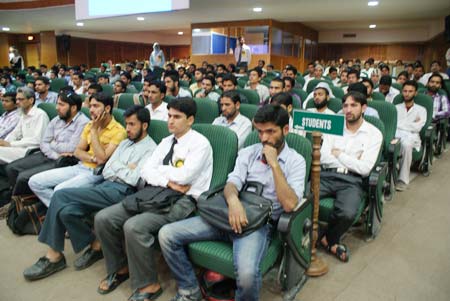
A view of audience
In addition to the five business sessions, a special session conducted by a great Islamic scholar, Mufti Nazir Ahmad Qasmi, was a special feature of the conference. In his spectacular style, the great Islamic luminary threw light on the concept of Islamic finance and presented an elaborative account of historical perspective, current scenario and future prospects of interest-free banking. He pleaded for an effective interface of scholars of Islamic finance, legal experts, bankers, academia and accounting professionals. The illuminating session ended with a live interaction between the speaker and the audience.
A unique feature of the international conference was the felicitation session in which some leading personalities from industry, banking and academia were awarded for their contribution to the society. Prof. S Fayyaz Ahmed, Registrar, University of Kashmir; Mr Tafazzul Husain of J&K Bank Ltd.; Mr Abdul Hamid Bhat of Rahim Greens; Mr Zubair Iqbal of HDFC Bank Ltd.; Mr Zahoor Ahmad Tak of J&K Yateem Trust; Mr Ajaz Ahmad Bandey of Bandey Impex Pvt. Ltd. and Prof. Hameed Naseem Rafiabadi, an Islamic scholar, got the awards with others.
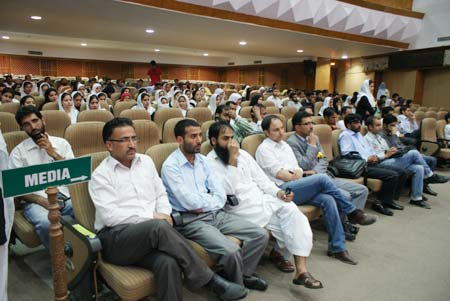
A view of audience
The three-day conference concluded with a valedictory session chaired by Prof. S Fayyaz Ahmad. Mr Tafazzul Husain was the chief guest. Mr. Tafazzul Hussain highlighted the role of J&K Bank Ltd. in the economic development of society and spelt out the possibility of introducing interest-free banking in the country alongside conventional banking.
In his presidential remarks, Prof. S Fayyaz Ahmad underlined the significance of organising such international events and stressed the need for evolving a consensus on the crucial issue. Earlier in the session, Prof. Musadiq Amin Sahaf presented resolutions evolved during the course of deliberations which were later adopted by the House.
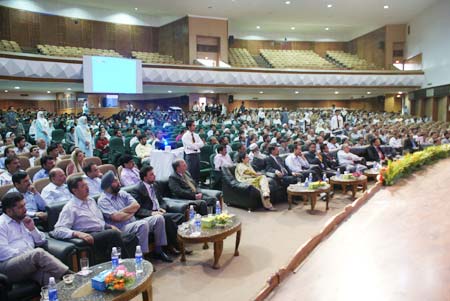
A view of audience
These included the need for introduction of diploma and certificate courses on interest-free and Islamic banking and finance in the universities and continual interaction among academia, banking and finance professionals and scholars for developing a regulatory framework. Certificates of merit were given to the delegates and participants followed by a vote of thanks proposed by Prof. Khursheed A Butt. The proceedings of the inaugural and business sessions were regulated by Dr. S Parvaiz A Shah and Dr. Reyaz A Rainayee conducted the valedictory session.
RESOLUTIONS
The conference adopted the following resolutions:
1. Introduce interest-free banking as advocated by Islamic philosophy as a competitive option for customers in India;
2. Develop a comprehensive and efficient infrastructure for interest-free banking;
3. Develop appropriate legal, regulatory and supervisory frameworks that could effectively cater to the growing demands of interest-free banking and ensure perfect alignment between interest-free banking and conventional banking;
4. Promote public awareness of interest-free banking services;
5. Facilitate and encourage the operation of free, fair and transparent markets in the interest-free banking services sector in India;
6. Enhance the access by all population segments to interest-free banking services;
7. Promote the development of standardised interest-free products through research and innovation;
8. Enhance the capitalisation, efficiency and flexibility of institutions offering interest-free banking to ensure that they are at par with international standards and best practices;
9. Conform to the international accounting and auditing standards applicable to interest-free banking institutions;
10. Foster collaboration with countries that offer interest-free banking services;
11. Develop the required pool of specialised, competent and high-calibre human capital for interest-free banking and ensure utilisation of state-of-the-art technology;
12. Strengthen and enhance collaboration among interest-free banking infrastructural institutions; and
13. Take initiatives and enhance financial linkages to integrate domestic interest-free banks with regional and international banking systems.
|